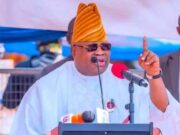Experts have blamed the dwindling fortunes of the nation’s maritime sector on inconsistencies of government policies, noting that some policy reversals have become inevitable to turn the tide.
Tom Igho, a clearing and forwarding agent in Tin-Can Island said the nation’s quest to achieve 24-hours cargo throughput was still a mirage because some policies have rendered it unachievable.
Pressed further, Igho said the regime of tariffs at the port among other surcharges was inimical to business these days.
Also cargo experts under the aegis of the Association of Nigerian Licensed Customs Agents (ANLCA) have expressed their misgivings over what they described as their growing misfortune as businessmen.
Specifically, the port agents, led by its Acting President, Kayode Farinto accused the Godwin Emefiele-led Central Bank of Nigeria (CBN) of encroaching into fiscal policy.
Farinto said the central bank is taking up responsibility of the government, which isn’t the purvey of the financial regulator, and this was affecting the operation of the Nigerian ports, reducing cargo volumes.
The ANLCA boss cited the 48 items on the forex prohibition list, which had forced traders to approach the black market for foreign exchange, and also discouraged declaration, in a report by the News Agency of Nigeria (NAN).
While blaming the CBN, he said, “The role of the Central Bank of Nigeria (CBN) too cannot be overlooked and this is because they are encroaching on fiscal policy which affects the importation of cargo.
“We have over 48 items on the forex prohibition list and these people are still going through black market, bringing these items is a problem and even when brought in, issues of declaration come in.
“That is why I say there is a decline and not an increase. If it’s not a decline, I will say that 40% of the containers are raw materials from all these multinationals and producing companies like Nigerian Breweries.”
Meanwhile, Farinto said the African Continental Free Trade Agreement (AfCFTA) should be placed under a newly established ministry to enable the Nigerian government monitor the free trade area and prevent the country from being a dumping ground.
“We are signatory to this convention and whether we like it or not, African countries need to bring their goods to our country and we cannot say no.
“The UK has an anti-dumping policy in spite of the fact that they are a member of the European Union and they used it to reject items they don’t want in their country, so we too need to do things right.
“AfCFTA is a lofty idea for African countries, a ministry to oversee issues in Nigeria will make us more prepared,” Farinto said.
It may be recalled that the CBN had imposed the prohibition list in 2015 to stop people from accessing forex for the purpose of importing locally available goods.
In international trade, some items cannot be imported from the producing country to another, Nigeria is no exception. There are some goods that are on the list of the Nigeria Customs Service, a security agency of the government that monitors the movement of goods into and out of the country, which is popularly called contraband.
In Nigeria, prohibited items are not allowed into Nigerian soil, they are not allowed into the market, access to such products is blocked by the government while anyone in possession of such items could possibly face prosecution or jail sentence.
Some of the reasons a government may ban the importation of some goods are to create jobs, boost local production as well as complement a rapid economic recovery. There are two categories of prohibition including permanent and temporary respectively.
An item could fall under the temporary prohibition list if the government plans to boost local production of a similar product.
For instance, the Buhari-led government banned the importation of rice into Nigeria as a means to boost local production, this falls under a temporary list because a succeeding government may revert such a decision.
One of them is the National Administration for Food, Drug, and Administration Control (NAFDAC) that regularly alerts the general public about the unsafe nature of an item.
Credit: thenationonlineng.net











































































